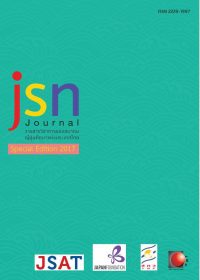Learning Japanese popular cultures according to animation and manga of Generation Z which a focus on University Students in a Japanese Business Course at Dhurakij Pundit University in Thailand
Main Article Content
Abstract
The objectives of studying popular Japanese cultures regarding animation, manga and types of communication which Thai teenagers who grow up in generation Z is interested. There are 104 students who study in year 1-4 of a Japanese Business course at Dhurakij Pandit University in Thailand were used to be population for the studying. The studying’s tool is 5 rating scale questionnaire and 0.95 of validity. There is using statistics such as mean and standard deviation (SD).Regarding to the studying, The Z generation students learn the Japanese cultures from animation and manga, which is a non-material culture such as value, belief, concept, lifestyle and behavior that showed on main characters. The most of student who interested in animation and manga usually pay attention on boy teenager and child style.They have created in Y generation since 1980 and paid attention until now.
Article Details
ข้อความและข้อคิดเห็นต่างๆ ในบทความเป็นของผู้เขียนบทความนั้นๆ ไม่ใช่ความเห็นของกองบรรณาธิการหรือของวารสาร jsn Journal
References
ขุนทอง อินทร์ไทย. (2532). กะเทาะสังคมญี่ปุ่น, 89 พิมพ์ครั้งแรก, กรุงเทพฯ : สมาพันธ์, 2532.
John,Storey.in “Popular culture and Popular culture as other” Cultural Theory and Popular Culture An introduction, 5-13(2006). [Online] Available: https://uniteyouthdublin.files.wordpress.com/2015/01/john_storey_cultural_theory_and_popular_culturebookzz-org.pdf Retrieved August 10,2016.
ชวรินทร์ ศิลปะสุวรรณ. (2558). การเรียนรู้ของเยาวชนไทยเกี่ยวกับวัฒนธรรมญี่ปุ่นผ่านสื่อการ์ตูนญี่ปุ่น. วิทยานิพนธ์ปริญญามหาบัณฑิต สาขาวิชานิเทศศาสตร์, มหาวิทยาลัยกรุงเทพ.
ธารา จันทร์อนุ. (2551). การวิเคราะห์หนังสือการ์ตูนญี่ปุ่นภาษาไทย ในช่วงปี พ.ศ.2544 – 2550. วิทยานิพนธ์ปริญญามหาบัณฑิต สาขาวิชาบรรณารักษศาสตร์และสารสนเทศ, มหาวิทยาลัยรามคำแหง.
ณัฐพล แสงทอง. (2550). “จูมง มหาบุรุษส่งเสริมการท่องเที่ยว” ใน“เนชั่นสุดสัปดาห์”(4 พฤษภาคม).
ปัทมา จันทร์เจริญสุข. (2552) “การ์ตูนญี่ปุ่น: Soft Power ของนโยบายด้านวัฒนธรรมของประเทศญี่ปุ่น. เอกสารการประชุมวิชาการ มหาวิทยาลัยเกษตรศาสตร์ วิทยาเขตกำแพงแสน ครั้งที่ 6. วันที่ 8-9 ธันวาคม 2552. มหาวิทยาลัยเกษตรศาสตร์ วิทยาเขตกำแพงแสน นครปฐม.
ปิยวรรณ สมบูรณ์ดี. (2550). พฤติกรรมการอ่านหนังสือการ์ตูนญี่ปุ่นในกลุ่มวัยรุ่นไทย: กรณีศึกษา นักเรียนชั้นมัธยมศึกษา โรงเรียนราชวินิตมัธยม กรุงเทพมหานคร. วิทยานิพนธ์ปริญญามหาบัณฑิต สาขาไทยศึกษา, มหาวิทยาลัยรามคำแหง
วรรณพงษ์ เตรียมโพธิ์ และอาทร นกแก้ว. (30 กรกฎาคม -1 สิงหาคม 2557). “ผู้เรียน Gen Z เรียนรู้ได้อย่างไร”. เอกสารประกอบการอบรมเชิงปฏิบัติการการเรียนการสอนสำหรับนักศึกษา Generation Z รุ่น 1 สถาบันนวัตกรรมการเรียนรู้, มหาวิทยาลัยมหิดล.
สุมน อยู่สิน. (2555). ทฤษฎีสื่อสารมวลชนตามแนวคิดสังคมมวลชนและวัฒนธรรมมวลชน. สืบค้นเมื่อ 6 สิงหาคม พ.ศ.2559 เข้าถึงได้จาก http://www2.feu.ac.th/admin/pr/newscontrol/atts/D20120502190040.pdf
sucheep.kar ที่ ๐๗:๒๒. (2552). แนวคิดวัฒนธรรมประชานิยม Popular Culture. สืบค้นเมื่อ 6 สิงหาคม พ.ศ.2559, เข้าถึงได้จาก http://sucheeppost.blogspot.com/2009/05/popular-culture.html
麻生太郎. เข้าถึงได้จาก http://www.aso-taro.jp/lecture/kama/2006_6.html. สืบค้นเมื่อ 6 สิงหาคม พ.ศ.2559


